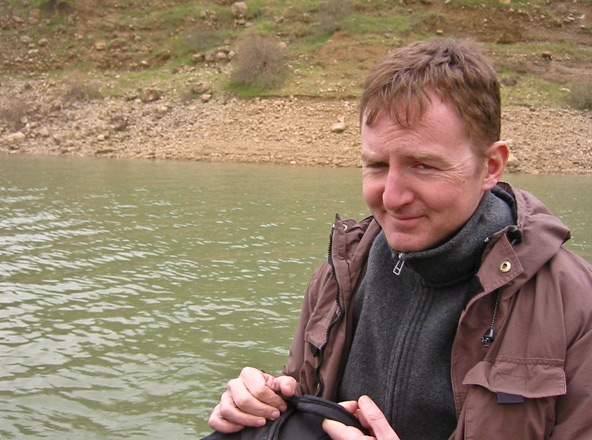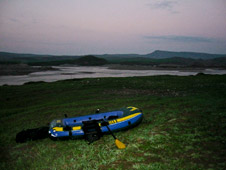
March 2003, Iraq. The great photographer and Welsh hurricane, Sion Touhig, displays his love of boats while crossing a reservoir on the Iraqi-Iranian border. Sion crossed the Tigris from Syria, using the same methods, equipped with a hand-drawn map of the checkpoint zone I emailed him from Erbil. We worked together in Iraq for the next few weeks.
Photo: Phillip Robertson
The fact was, I was in the wrong place. Syria has a stretch of Mediterranean coast and a major port at Lattakia, and though that was more 400 miles west of the place where I wanted to enter Kurdistan, I took my last chance and went there via Damascus. In Lattakia, the boyhood home of the late Syrian President Hafez Al-Assad, a friend picked me up from the hotel and then took me straight to the local chandlery. It was a small store heaped with nets and nylon rope run by a cantankerous old guy who didn't have time for tourists. In the window was a box with a picture of an inflatable two-man rowboat on it. Not too heavy, easy to hide. And it came with a pump and plastic oars. My friend translated my question into Arabic: "How much do you want for it?" The old man sold it to me at a fair price.
My friend drove me down a steep cliff road to the sea, where we unpacked the rowboat for its maiden voyage. Lattakians watched us from the cliff while N. hunched over the air pump until the boat no longer looked like a shriveled skin. It took shape and became a proper form of transportation in a mere minutes, a mundane transformation anywhere else but Syria. I did a jig in celebration.
Above us in an old seaside cafe, men sat smoking nargileh water pipes and drinking tea.
We carried the new boat, which smelled strongly like plastic, and put it in the water, and I climbed in and tried to get a feel for the oars. As the boat moved away from the shore, N. became a small figure, and soon there was only the sea and the soft air and the ships on the horizon. I rowed until my shoulders and hands burned and the boat flew in a straight line over the warm blue-green water of the Mediterranean.
I left the next morning for the Qamishli, the eastern border post. I had to cover the distance of 400-plus miles again, this time traveling by bus with my new boat rolled up and hidden in a cheap suitcase. The plastic oars bothered me. Even a Syrian cop could figure out what they were for, and they were easy to find in the satchel. The problem was that bus stations are closed police checkpoints where everything is haphazardly searched, especially foreigners. Once you're inside the station, there's no way out. The gates are immediately shut, and the police have the passengers at their mercy and can inspect and prod away at their leisure.
I wasn't even out of the Lattakia station before I was confronted with my first test. I was one of the only passengers traveling so early in the morning, and all of a sudden the Syrian official was by my side making searching motions. He searched the luggage of the man I was speaking to and then he searched the duffel with the boat in it -- and promptly pulled out an oar. The cop then put the oar nicely back in the bag.
Later, as I was changing buses in Aleppo, I was quickly arrested after telling the authorities I was a friend of Bill Clinton's -- but I was just as quickly released. A beautiful moment came and went as the station officials, bus drivers and other random onlookers heaped praises on an American president. Then the police found the boat again. The first cop put the oars back in their place and never asked me what I was doing with such a thing heading for the border. The commanding officer signaled for me to wait, so he could find the special permission stamp for Qamishli. He grinned as he stamped the ticket. Clinton's Herculean efforts at peace in the Middle East did not go unnoticed in Syria, and the mere mention of his name made things suddenly right, a Get Out of Jail Free card.
Seven hours and an uneventful ride later, the cops weren't around in the Qamishli station. It was a small victory, and it was easy to get to a cheap hotel with the boat and get ready for the river crossing the next afternoon.
On Friday, March 14, a cabbie picked me up at the hotel thinking that I was going to Turkey. When we were in the car, I told him the truth: I was headed to the Tigris River crossing. We headed east out of town, then stopped at a cafe. There, I drew him a diagram that showed how I needed him to drive through the border checkpoints and drop me off half a mile short of the secret-police station at the water. The driver, a Kurd, wanted to know if I was going to swim; he asked if I had a wife and a family. He worried about the authorities and he thought that I was going to taint him with some bad foreigner luck, and it took a long time to persuade him to take me to the river. I explained that I had a boat and that the Syrians would never see me.
The driver took a minute to think about it and finally agreed, then looked sadly at the diagram. We drove through the late afternoon sun toward the Tigris, then through the first checkpoint, which was manned by a teenager who chased after us and forced us to stop the car. The driver spoke to him in Kurdish and he let us through. We rolled through the second checkpoint, past the green wheat fields and Bedouin farmers, until we found a place that had a deep ravine near the road. I asked him to stop the car. At the top of the hill, the driver let me out and waved goodbye. The river was half a mile from the crest, the ferry crossing to Kurdistan just to the north, and on the south side was the Iraqi border, marked by a mining operation. The plan was to get the boat in the Tigris between those boundaries.
 LEAD IMAGE: 12 March, 2003, Iraq. I crossed the Tigris river from Syria to Iraq in an inflatable boat. It was cold night and I was slightly worried about drifting downstream into Saddam-controlled territory. Once across the river it seemed wise to wait for dawn to break before moving around. Shortly after these pictures were taken, a man in dump truck gave me a ride to Dohuk, Kurdistan.
LEAD IMAGE: 12 March, 2003, Iraq. I crossed the Tigris river from Syria to Iraq in an inflatable boat. It was cold night and I was slightly worried about drifting downstream into Saddam-controlled territory. Once across the river it seemed wise to wait for dawn to break before moving around. Shortly after these pictures were taken, a man in dump truck gave me a ride to Dohuk, Kurdistan.Photo: Phillip Robertson
© Phillip Robertson, 2009-2014.
